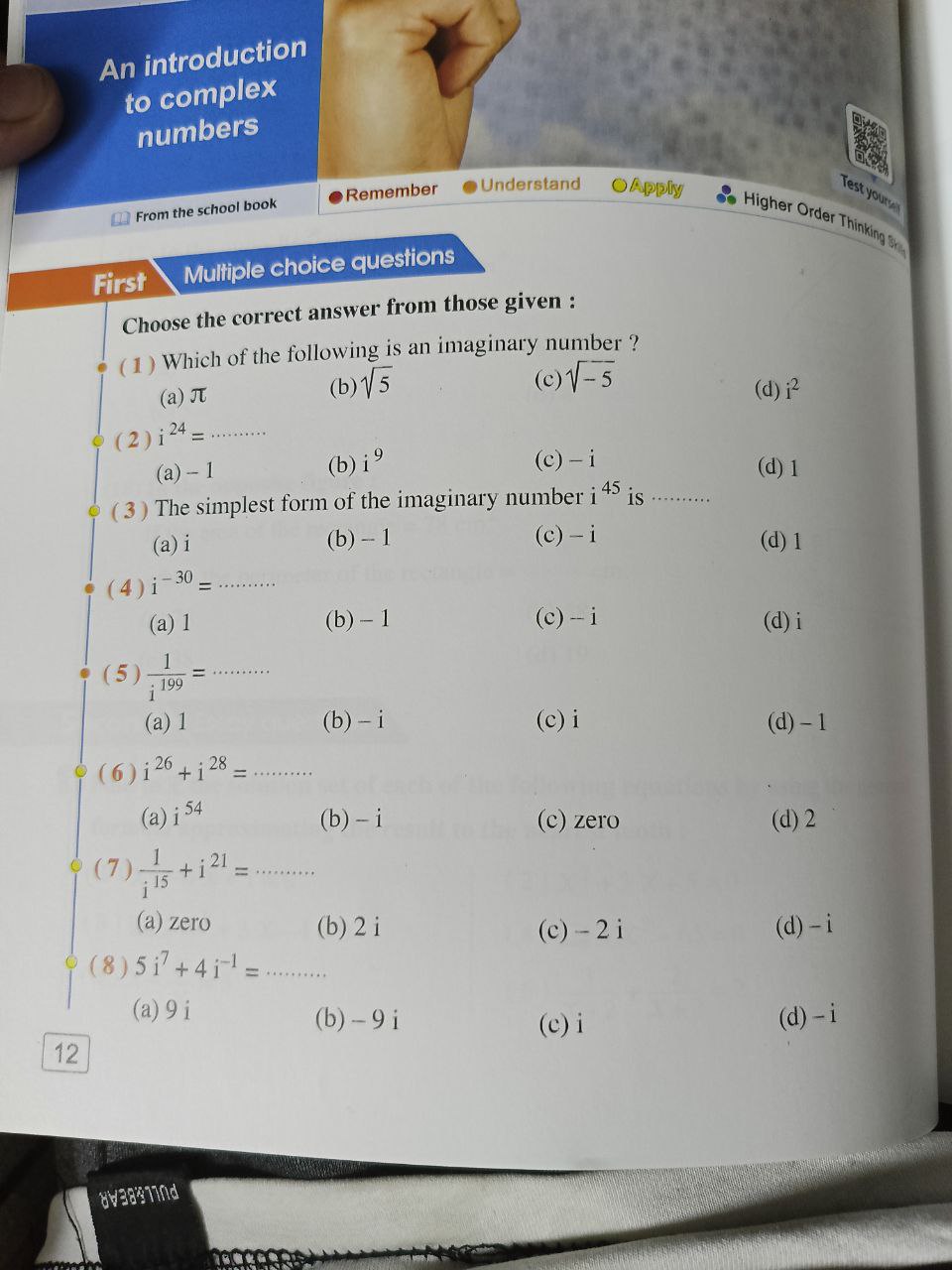Which of the following is an imaginary number? i^24; The simplest form of the imaginary number i^45; i^30; (1/i) ^199; i^26+i^28; (1/i) ^15; 5i^7+4i^-1.

Understand the Problem
The question consists of multiple-choice problems related to complex numbers and imaginary numbers, asking for simplifications and identities of complex expressions.
Answer
1. 1; 2. $i$; 3. $-1$; 4. $i$; 5. zero; 6. $i$; 7. $-9i$.
Answer for screen readers
- (a) 1
- (b) i
- (c) -1
- (c) i
- (c) zero
- (c) i
- (b) -9 i
Steps to Solve
- Understanding the Powers of $i$
The imaginary unit $i$ is defined such that $i^2 = -1$. The powers of $i$ repeat every four terms:
- $i^1 = i$
- $i^2 = -1$
- $i^3 = -i$
- $i^4 = 1$
We can reduce higher powers of $i$ to these values by taking the exponent modulo 4.
- Calculating Each Expression
-
(1) For $i^{24}$:
Calculate $24 \mod 4 = 0 \Rightarrow i^{24} = i^0 = 1$.
-
(2) For $i^{45}$:
Calculate $45 \mod 4 = 1 \Rightarrow i^{45} = i^1 = i$.
-
(3) For $i^{30}$:
Calculate $30 \mod 4 = 2 \Rightarrow i^{30} = i^2 = -1$.
-
(4) For $\left(\frac{1}{i}\right)^{199}$:
Use $\frac{1}{i} = -i$, so $\left(-i\right)^{199}$. Calculate $199 \mod 4 = 3 \Rightarrow (-i)^{3} = -i^{3} = -(-i) = i$.
-
(5) For $i^{26} + i^{28}$:
Calculate $26 \mod 4 = 2 \Rightarrow i^{26} = -1$ and $28 \mod 4 = 0 \Rightarrow i^{28} = 1$. So, $-1 + 1 = 0$.
-
(6) For $\left(\frac{1}{i}\right)^{15}$:
Similar to step 4, $\left(-i\right)^{15}$: $15 \mod 4 = 3 \Rightarrow (-i)^{3} = -i^{3} = -(-i) = i$.
-
(7) For $5i^7 + 4i^{-1}$:
Calculate $7 \mod 4 = 3 \Rightarrow i^{7} = -i$ and $i^{-1} = -i$. Therefore, $5(-i) + 4(-i) = -5i - 4i = -9i$.
- Compiling Results
After calculating, we summarize:
- (1) $1$
- (2) $i$
- (3) $-1$
- (4) $i$
- (5) $0$
- (6) $i$
- (7) $-9i$
- (a) 1
- (b) i
- (c) -1
- (c) i
- (c) zero
- (c) i
- (b) -9 i
More Information
The only imaginary number here is represented in the forms of $i$, $-i$, and their multiples. An imaginary number can be expressed as a multiple of $i$. This highlights that the manipulation of powers of $i$ is crucial for simplifying complex expressions.
Tips
- Forgetting to apply the modulo operation when simplifying powers of $i$.
- Confusing $i^{3}$ with its negative counterpart.
AI-generated content may contain errors. Please verify critical information